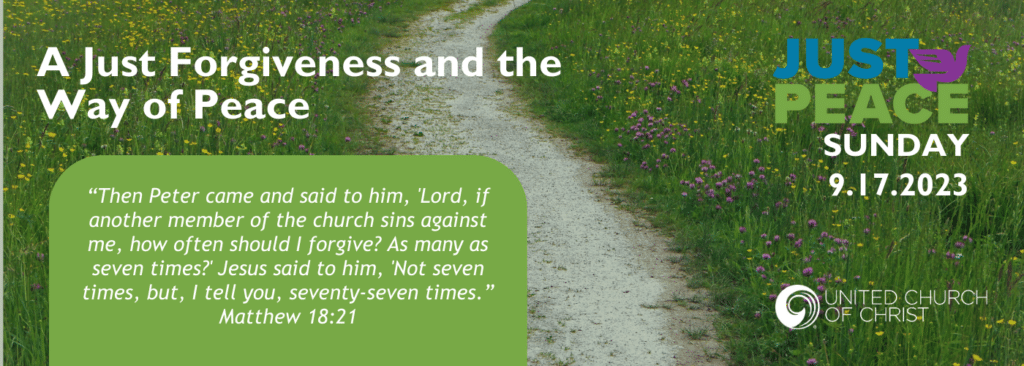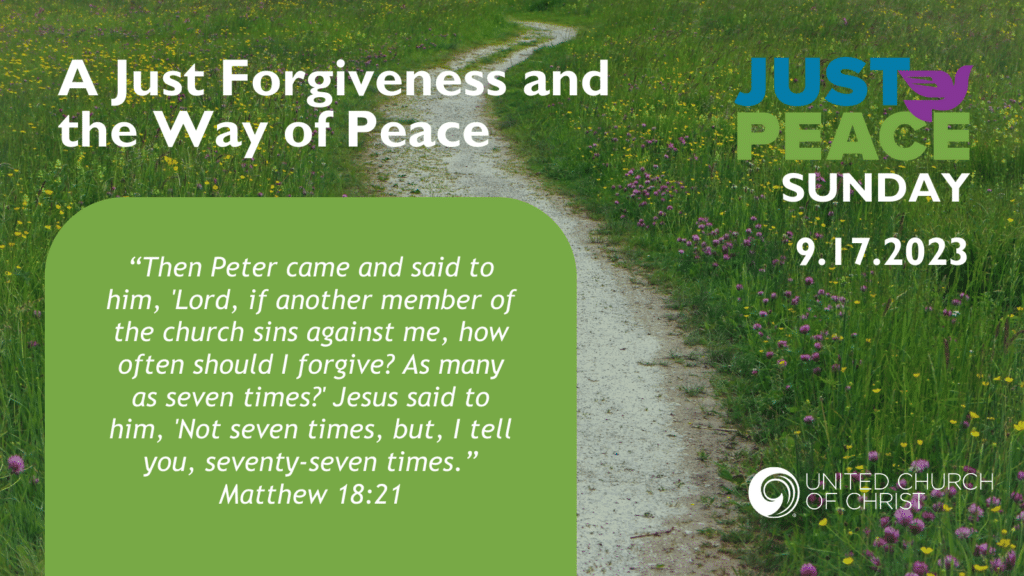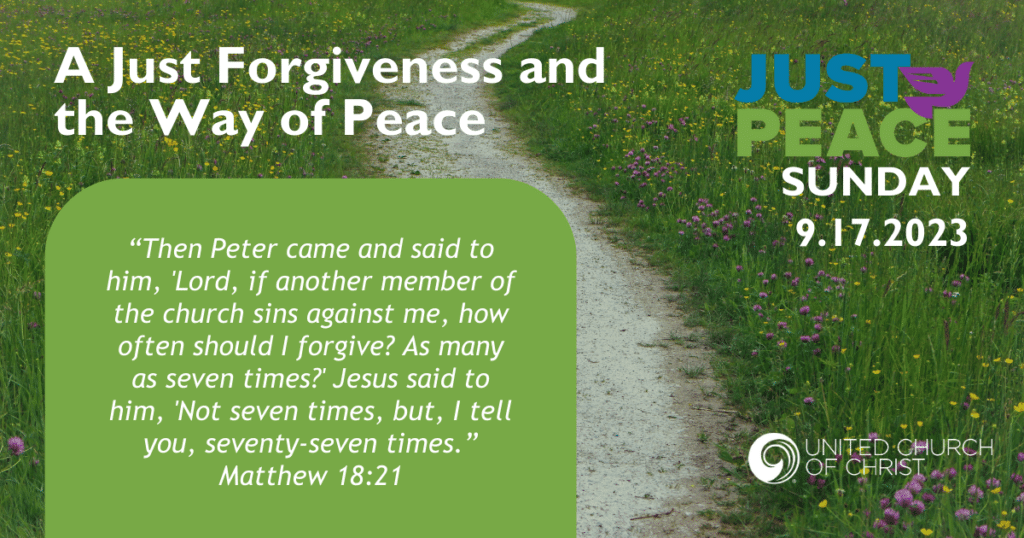Just Peace Sunday 2023

The Thirtieth General Synod called on the congregations of the United Church of Christ to mark the Sunday preceding September 21 (which the United Nation recognizes as the “International Day of Prayer for Peace”) as Just Peace Sunday.
In 2023, Just Peace Sunday is Sept. 17
“A Just Forgiveness & the Way of Peace”
Then Peter came and said to him, ‘Lord, if another member of the church sins against me, how often should I forgive? As many as seven times?’ Jesus said to him, ‘Not seven times, but, I tell you, seventy-seven times.‘
Matthew 18:21-25
The Just Peace Sunday theme for 2023 comes from lectionary passage Matthew 18:21-25, in which Peter asks Jesus how often he should forgive. Peter suggests “seven times?” as a reasonable amount, while Jesus counters, “Not seven times, but, I tell you, seventy-seven [or seventy times seven] times.”
Princeton Seminary Professor Dr. Eric Barreto notes in his commentary, that Jesus’ response (70×7!) points to a sense of radical, extravagant, even unconditional forgiveness and grace. And yet, he notes, it must also be read as a “counter-balance” to the strict confrontations in Matthew 18:18 in which the community is given the power to confront sin (“Whatever you bind on earth will be bound in heaven, and whatever you loose on earth will be loosed in heaven”). As Susan Hylen notes in her article Forgiveness and Life in Community, “the beauty of the parable seems to be its power to assert that forgiveness can be conditional, while at the same time compelling the reader to forgive.” We see in Matthew an attempt toward a just forgiveness.
The complex interplay between justice and forgiveness is key to highlight, and is reflected not only in macro-level Truth and Reconciliation processes, such as in South Africa, but also on the interpersonal level. Too often, forgiveness is sought before truth and harm are fully acknowledged. Rev. Dr. Marie Fortune, founder of FaithTrust Institute, posits that forgiveness should be the last step in the healing process, and must be founded on justice only if/when the victim is ready. This process or “way” is also reflected in scripture. As Fortune notes in the article “Forgiveness: The Last Step”:
“For the Christian, it is finally the power of the Holy Spirit that enables the healing process to take place. This spiritual power gives the victim the strength to forgive, to let go. It gives the victimizer the strength to repent, to change. It gives the church the strength to help both persons in the justice-making process. But the power of the Holy Spirit is released only when justice is made manifest for the victim and offender. Whenever there is an attempt to cut the process short and jump to premature reconciliation, the possibility of authentic healing is lost.”
As a Just Peace Church and as people of faith, we must seek the long path of true peace and justice, balancing the demands of justice and forgiveness. Forgiveness has long been one of the Just Peace Practices. Practice #4 calls us to “Acknowledge responsibility for conflict and injustice and seek repentance and forgiveness.” Forgiveness and justice are key principles in the work of peace building, reconciliation, and restorative justice. As the World Council of Churches’ Just Peace Companion book notes, “Practicing forgiveness and engaging in processes of reconciliation, together with active, life-affirming nonviolence, are basic marks of the way of Just Peace” (WCC Just Peace Companion, p. 49).
In our relationships, our communities, and our world, let us seek the way of a just forgiveness, and together bring about a more peaceful and just future.
-Rev. Michael Neuroth, Director of the Washington D.C. Office
Observe Just Peace Sunday! Here are some resources to use in your congregation:
Liturgical Resources
- Sermon Spark by Rev. Dr. Sheila Harvey
- Sermon: A Just Peace Begins in the Heart by Rev. Denise Andersen
- Liturgy for Just Peace Sunday: “A Just Forgiveness and the Way of Peace” – Written by Rev. Amber Neuroth
- Litany for Just Peace Sunday (based on Psalm 34:14b): “Seek Peace & Pursue it” – Written by Rev. Bob Moore
- Opening Prayer and Call to Worship – Rev. Denise Andersen
Additional Scriptures
- Psalm 34:14b
- Psalm 51:10
- Psalm 139:23
- Ezekiel 36:26
- Romans 12:2
- Matthew 22:37
Suggested Music
- “Let Us Talents and Tongues Employ” – New Century Hymnal #347
- “Come, My People” – Sing! Prayer and Praise Songbook #12
- “Take My Life, God, Let it Be” – New Century Hymnal #448
- Additional music: “There’s a Spirit of Love in This Place”, “I’ve Got Peace Like a River”, “This Little Light of Mine”, “Let There Be Peace on Earth”
Art for Just Peace Sunday
Quotes for Reflection
“I have often paused to reflect on the persistent question: how do we restore the moral and social order subjected to such horrific violence? My reasoned conviction, confirmed in turn by biblical revelation, is that the shattered order cannot be fully restored except by a response that combines justice with forgiveness. The pillars of true peace are justice and that form of love which is forgiveness.” – Pope John Paul II’s World Day of Peace message: “No Peace Without Justice, No Justice Without Forgiveness”
“Peace cannot be kept by force; it can only be achieved by understanding.” – Einstein
“It isn’t enough to talk about peace. One must believe in it. And it isn’t enough to believe in it. One must work at it.” – Eleanor Roosevelt
“It doesn’t matter how strong your opinions are. If you don’t use your power for positive change, you are indeed part of the problem.” – Coretta Scott King
Messages of Hope: Preaching Peace and Justice for All is a book by Rev. Dr. Sheila Harvey that can be used for additional study and reflection throughout the year.
Actions
- Read this “Getting to the Root” article on Solitary Confinement by Laura Markle Downton (National Religious Campaign Against Torture) & a UCC News article on the resolution on Solitary passed by General Synod.
Study Resources
 Download the Just Peace Handbook
Download the Just Peace Handbook
In 2015, the 30th General Synod held in Cleveland, OH marked the UCC’s 30th anniversary as a Just Peace Church and called for a renewal of the UCC’s Just Peace witness. This booklet is intended to accompany this resolution and be a resource for all levels and areas of the church for further work and witness, especially to local congregations declaring or recommitting themselves as “Just Peace Churches.” This resource includes a summary of the historical and theological uniqueness of the Just Peace vision; the biblical and theological grounding for Just Peace values; and recommended steps for how to become a Just Peace Church. (Download.)
Find additional resources here.
What is Just Peace?
Just Peace is not a destination, but a path requiring awareness and constant vigilance to resolve existing and developing conflict in ourselves, our families, our communities, our institutions, and our world. This path requires non-violence when possible and even when impossible to engage in love and restraint. Just Peace envisions a renewed, vibrant, diverse, and sustainable world free of violence.
Just Peace is grounded in God’s activity in creation; God’s covenant patience and provision in the wilderness; in the reconciling activity of Jesus Christ; in the presence of the Holy Spirit; and in the community of reconciliation. Shalom is the vision that pulls all creation toward a time when weapons are made into ploughs and all creatures lie down together without fear; where all have their own vine, fig tree, and dwell secure from want. As Christians, we offer this conviction to the world: Peace is possible!


